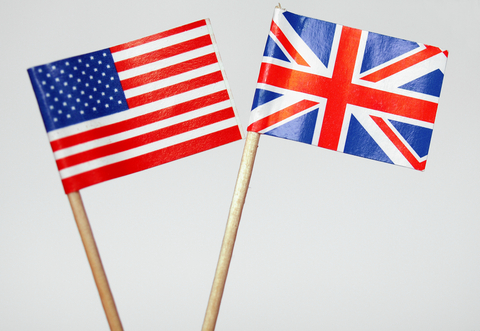

How much do you think you know about American English and how it varies from the British version? Here is an article that may provide surprising information about the differences and a few interesting facts about how we got to where we are today. When the first British colony was established in North America in 1607, the settlers brought over the British English language with them. At that time, spellings of the language had not yet been formalized, and people wrote words in the way they thought they sounded. It took until the 16th and 17th centuries for the standardization of the languages of the two nations to begin. However, even then, different regional dialects meant that there were still many variations in spelling and grammar.
At the same time as the first colonists were landing, William Shakespeare, the great British playwright, never adopted a standard spelling of his name – showing just how unformalized the language was at that time. In fact, there are 80 different recorded spellings of his surname alone, and never once did he write his name as we know it today. The American Revolution in 1776 was a turning point for the English language in North America. After the War of Independence, America became its own country with its own identity and culture. And as the new nation developed, so did its version of the English language. One of the most noticeable differences between American and British English words is pronunciation, but there are also differences in spelling, vocabulary, and grammar. As teachers, we can foster a more inclusive classroom environment for our students when we demonstrate our awareness of these differences and aid those wishing to adapt to the local language variant.
In British and American English, many other words have different spellings, but the -or/-our ending is by far the most common. While adults can generally retrain themselves without too much difficulty, for students who were taught to write and speak English in another country, it can be very stressful to be told that the previous rules learned are deemed incorrect in their new country. Having a clear set of examples to demonstrate patterns between the British English spelling and the American spelling can be highly beneficial for such students.
See below for other common examples.
|
British English |
American English |
|
-oe-.-ae- (aeon, aesthetic, anaemia, archaeology, gynaecologist, paediatrician) |
-e- (aeon, esthetic, anemia, archeology, gynecologist, pediatrician) |
|
-t (burnt, dreamt, leapt, learnt, smelt, and spelt) |
-ed ( burned, dreamed, leaped, learned, smelled, and spelled) |
|
-ence (defence, offence, licence) |
-ense (defense, offense, license) |
|
-ell- (cancelled, marvellous, jeweller, traveller) |
-el- (canceled, marvelous, jeweler, traveler) |
|
-ise (specialise, appetiser, advertise, comprised) |
-ize (specialize, appetizer, advertize, comprized) |
|
-ogue (analogue, monologue, catalogue) |
-og (analog, monolog, catalog) Note: American English also accepts these words when ending -ogue, but not vice versa. |
|
-ou (colour, flavour, mould) |
-o (color, flavor, mold) |
|
-re (metre, calibre, centre) |
-er (meter, caliber, center) |
|
-yse (analyse, catalyse, paralyse) |
-yze (analyze, catalyze, paralyze) |
There are also some differences in vocabulary between American and British English. We both share the same roots in our language, even with minor spelling differences, but on occasion, completely different words have developed to describe the same thing. For example, the word "pavement" is used to describe the paved area beside the road in British English, whereas in American English, the term "sidewalk" is used. Sometimes, these differences can cause a cascade of alternative words. In British English, smartly dressed men might wear a waistcoat over their shirts. In American English, this is called a vest. Yet the British also use the word vest, but this is what Americans call an undershirt. Sometimes these differences stem from British or American popular culture or brand names that have become ubiquitous; for example, while an American will vacuum their home, in the United Kingdom it’s common to say they hoovered their house (Hoover is a brand of Vacuum).

When criticizing each other's use of the language, it's common for the British to find the American word "Fall" to describe Autumn, yet most don't realize that Fall was a word used by the English first to describe the same thing. It was popular in the 17th century but fell out of favor in England while remaining popular in the US.
Below are a few of the many examples of vocabulary differences.
|
British English |
American English |
|
Trousers |
Pants |
|
Flat |
Apartment |
|
Appetizer |
Starter |
|
Crisps |
Chips |
|
Chips |
Fries |
|
Fringe |
Bangs |
|
Boot (back of car) |
Trunk |
|
Bonnet (front of car) |
Hood |
|
University |
College |
|
Sweets |
Candy |
|
Mobile Phone |
Cell Phone |
Beyond the spelling and vocabulary differences, there are also some grammatical differences between American and British English. One example is the use of the present perfect tense. In British English, it's common to say, "I've finished my work," whereas, in American English, it's more common to say, "I finished my work." The use of the present perfect tense often indicates whether something happened in the past or if it has a connection to the present. So, when a British person says, "I've finished my work," they usually indicate that their work is now complete and there is no connection to the present. On the other hand, when an American says, "I finished my work," they might indicate that their work is now complete, or they might be talking about an event that happened in the past with no connection to the present. Another example of a grammatical difference is using the gerund (-ing form) after certain verbs. In British English, it's common to say,"I'm sorry for interrupting," whereas, in American English, it's more common to say, "I'm sorry to interrupt." The British spellings tend to continue to use formal speech, such as "I shall," while Americans are more likely to say "I will." One notable word is "gotten." In British English, the word "got" is used for both past tense and present perfect. In American English, "got" is only used for past tense, and "gotten" is used for present perfect. So while the British would say, "I've got a new car," in American English, you would say, "I've gotten a new car."

Language continues to evolve, even in different regions of the same country, leading to various accents and different uses of words. But a fact most British people are unaware of, and would be horrified to learn, is that American English is closer to the English Language of 16th Century Britain than the modern British language is. The cause of this is England's proximity to its neighbors. While Americans were going about their business through the 17th century, the British language went through a period of French influence.
The French influence was so significant that British English has come to use many more French words than American English does. For example, the word "carriage" is used to describe a vehicle you take to transport yourself in Britain, whereas in the USA, the term "wagon" is used. The influence of France led to the British elite adopting softer pronunciations of the letter r. And in a classic case of keeping up with the elite, the middle classes followed suit. Eventually, the language had a softer sound and considerably more French-origin words used in everyday British English.
While the two languages have differences, British and American English have many more similarities. Accidently using an incorrect spelling or an alternative word does not lead to misunderstandings generally. Overall, both the US and UK variants of the languages mesh well. To most speakers, the languages seem virtual copies of each other, with the few differences coming from vocabulary differences, like crisps and chips, but in writing, the differences become much more obvious, though these differences rarely cause any form of confusion.
In addition, the internet is slowly remolding the way both sides of the Atlantic choose to spell some words, so teachers should not be surprised if they find students muddling spelling on occasion. It's likely that in a few decades, American and British English will have strengthened their similarities, possibly even spawning a new middle-variant of the English language.
Date: October 4th, 2022
Rob